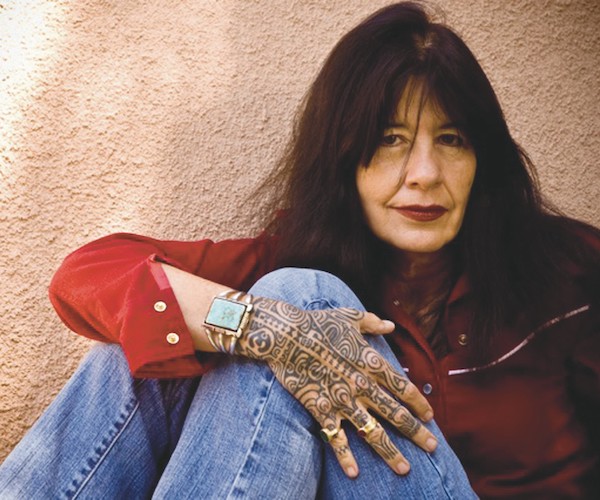Poetry Commentary: Native American Poet and Activist Joy Harjo at Tanglewood — A Disappointment
By Robert Israel
Many have surrendered to Joy Harjo’s undeniable shamanistic charms and classify her as a national treasure.
Joy Harjo at the Spotlight Series, Tanglewood Learning Institute, Boston Symphony Orchestra’s Ozawa Hall, Lenox, MA, on July 30.

Poet Joy Harjo. Photo: Wiki Common/Poetry Foundation
It came as a bit of a shock to experience the Native American poet and activist Joy Harjo in person at Tanglewood. It was an opportunity to compare her presence with her prolific literary and civic accomplishments. The author of nine books of verse and a two-volume memoir, she is also an accomplished musician, a playwright, a lecturer at numerous colleges and universities, and, most recently, the inaugural Artist-in-Residence at the Bob Dylan Center in her native Tulsa, Oklahoma. Given all this, I expected that the 71-year-old Harjo would project a bold and commanding persona and that she would be politically outspoken, in view of her having served, three times, as US Poet Laureate. That did not turn out to be the case.
Instead, Harjo chose to cultivate our attention through prayerful solemnity. Rail-thin, she stands a little more than five feet tall. She has a thick mane of dark hair that partially conceals her eyes, deeply set into her face. She speaks so softly that even with the aid of a microphone — and the acoustics of BSO’s Ozawa Hall — most of her recital was inaudible.
After thanking the audience for their “warm welcome,” she smiled and said she was glad to be on soil where her blood kin — the Algonquin, Nipmuc, Mohican, and Mohawk tribes — once thrived. Her persona was devoid of egotism. She paid homage to her ancestors and said she expresses their spirits through her works.
Harjo self-identifies as a “poet warrior,” an appellation that dates from the time of Thucydides, a Greek general and historian, in 411 BC. A member of the Mvskoke Nation, she draws from the many living (and departed) souls that occupy the Oce Vpof (Hickory Ground), a sacred, mystical place in which her kinfolk trace their roots back centuries. But her version of a “poet warrior” was not in any way fiery (more about that in a moment). Instead, her lyricism came off as dreamy, almost somnambulistic.
But back to the secular: Harjo is a political poet because she accepted the title of US Poet Laureate and government funds support the position. But she did not discuss controversial issues during her Tanglewood appearance. She did not share her thoughts, for example, about Pope Francis, who apologized to the indigenous people of Canada during his visit there a few weeks ago. His was a much delayed response — that many critics found limited — to the decades-long cruel and systemic abuse of adults and children at the hands of Catholic zealots. Harjo did not mention her role in helping to launch “Living Nations, Living Words,” a Library of Congress-funded website that connects Native Americans to one another, providing a vital digital link among Indian people. She did not come across as a firebrand, like Buffy Sainte Marie, who wrote the famous protest song, “Universal Soldier.”
Instead, she assumed the role of shaman. She lifted a flute to her lips and played a dirge, one of the only times in Ozawa Hall when the cavernous acoustics conspired in her favor. She read poems that celebrated the natural world (without referencing our current climate crisis), her words marveling at the miracles found in the natural world, as in her poem “Cricket Song” from her volume Conflict Resolution for Holy Being:
Tonight I catch a cricket song/Sung by a cricket who wants the attention of another/My thinking slides in the wake of the cricket’s sweet/Longing. It’s lit by the full moon as it makes a path/Over the slick grass of the whitest dark.
Her sentiments resonated with the philosophy of 19th-century New England transcendentalists — Emerson and Thoreau — who wrote about the “all feeling” they felt communing with nature, a theme that was adopted by the late 20th-century Provincetown-based poet Mary Oliver, who rhapsodized about the restorative powers she enjoyed when experiencing nature. But there was another 19th-century Berkshire resident, author Herman Melville, who warned of the dangers that are sure to follow when we surrender to that “all feeling.” He believed that it is perilous to relax one’s grip on reality — among other things, Moby-Dick is a testament to American hubris. Give into transcendental reverie — as in the case of Captain Ahab — and monsters will be unleashed. They have been, and there are more to come.
Many have surrendered to Harjo’s undeniable shamanistic charms and classify her as a national treasure. But her recital at Ozawa Hall was disappointing. She seemed to be more interested in assuaging our fears with old reassurances than reminding us to remain vigilant about the dangers to come in unprecedented times. As Isabelle Stengers writes in her book In Catastrophic Times, “We are no longer dealing (only) with a wild and threatening nature, nor with a fragile nature to be protected, nor a nature to be mercilessly exploited. The case is new.”
Robert Israel can be reached at risrael_97@yahoo.com.

Obviously, Joy Harjo is a true artist, and you are a politician posing as an art critic.